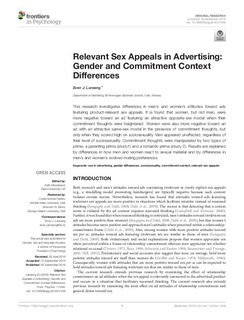| dc.contributor.author | Lanseng, Even Johan | |
| dc.date.accessioned | 2016-11-08T08:38:08Z | |
| dc.date.available | 2016-11-08T08:38:08Z | |
| dc.date.issued | 2016 | |
| dc.identifier.citation | Frontiers in Psychology, 7(2016)1456, 1-11 | nb_NO |
| dc.identifier.issn | 1664-1078 | |
| dc.identifier.uri | http://hdl.handle.net/11250/2419950 | |
| dc.description | This is an open access journal available from http://journal.frontiersin.org/journal/psychology | nb_NO |
| dc.description.abstract | This research investigates differences in men's and women's attitudes toward ads featuring product-relevant sex appeals. It is found that women, but not men, were more negative toward an ad featuring an attractive opposite-sex model when their commitment thoughts were heightened. Women were also more negative toward an ad with an attractive same-sex model in the presence of commitment thoughts, but only when they scored high on sociosexuality. Men appeared unaffected, regardless of their level of sociosexuality. Commitment thoughts were manipulated by two types of prime, a parenting prime (study1) and a romantic prime (study 2). Results are explained by differences in how men and women react to sexual material and by differences in men's and women's evolved mating preferences. | nb_NO |
| dc.language.iso | eng | nb_NO |
| dc.publisher | Frontiers Research Foundation | nb_NO |
| dc.title | Relevant sex appeals in advertising: Gender and commitment context differences | nb_NO |
| dc.type | Journal article | nb_NO |
| dc.type | Peer reviewed | nb_NO |
| dc.source.journal | Frontiers in Psychology | nb_NO |
| dc.identifier.doi | http://dx.doi.org/10.3389/fpsyg.2016.01456 | |
| dc.description.localcode | 2, OA. Forlagsversjon | nb_NO |
